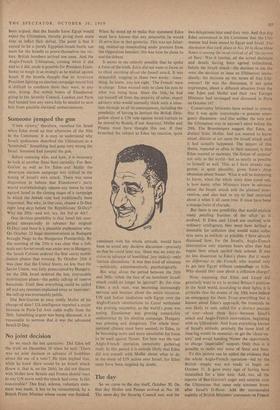Someone jumped the gun
'Clean victory,' therefore, vanished for Israel when Eden stood up that afternoon of the 30th in the Commons. It is easy to understand why Israeli spokesmen described the Ultimatum as a 'bombshell.' Something had gone very wrong for Israel. Someone had jumped the gun.
Before assessing who, and how, it is necessary to look at another Sinai-Suez curiosity. For Ben- Gurion as well as for Eden and Mollet the American election campaign was critical in the timing of Israel's own attack. There was some disposition to believe that Eisenhower's party would overwhelmingly oppose any move by him against Israel in the closing stages of a campaign in which the Jewish vote had traditionally been important. But why, in that case, choose a D-Day eight long days before the Republicans' D-Day? Why the 29th—and not, say, the 3rd or 4th?
One obvious possibility is that Israel felt com- pelled unexpectedly to advance her original D-Day; and there is a plausible explanation why. On October 23 huge demonstrations in Budapest brought Nagy to the Hungarian Premiership. By the morning of the 25th it was clear that a full- scale anti-Soviet revolt was under way in Hungary; the Israeli Cabinet ordered the first secret mobil- isation phases that evening. By October 28th it was clear that the United States, no less than the Soviet Union, was fully preoccupied by Hungary; on the 28th Israel ordered the last, irrevocable mobilisation phase—the public call-up of reserve battalions. Until then everything could be called off and any rumours explained away as 'exercises'; the call-up was irrevocably public.
Did Ben-Gurion at once notify Mollet of his change of date? US intelligence reported a major increase in Paris-Tel Aviv cable traffic from the 26th. Something urgent was being discussed; it is reasonable to surmise that it was the advanced Israeli D-Day.










































 Previous page
Previous page